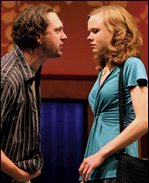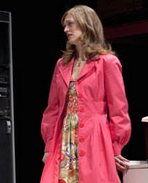SITE GUIDE
SEARCH
REVIEWS
REVIEW ARCHIVES
ADVERTISING AT CURTAINUP
FEATURES
NEWS
Etcetera and
Short Term Listings
LISTINGS
Broadway
Off-Broadway
NYC Restaurants
BOOKS and CDs
OTHER PLACES
Berkshires
London
California
New Jersey
DC
Philadelphia
Elsewhere
QUOTES
TKTS
PLAYWRIGHTS' ALBUMS
LETTERS TO EDITOR
FILM
LINKS
MISCELLANEOUS
Free Updates
Masthead
A CurtainUp Review
reasons to be pretty
reasons to be pretty Moves to Broadway With 2 New Cast Members and a Smartly Restructured ScriptBy Elyse Sommer
The Lyceum is a good choice for Neil LaBute's Broadway debut, big enough to accommodate a larger audience than the Lucille Lortel downtown but not too big for this four character play to look lost or the audience too distanced from the four actors.Except for the changes in the cast and the monologue-less structure, my comments about the Off-Broadway productions still apply. That review covers why I feel the lower-cased title is as aptly symbolic as those boxes framing the otherwise move-about set as well as links to previous reviews of LaBute plays. To read that original review, just scroll down past the production notes. Production Notes: reasons to be pretty By Neil LaBute Directed by Terry Kinney Cast: (*for actors reprising original roles) *Thomas Sadoski (Greg), Marin Ireland (Steph),* Piper Perabo (Carly) and Steven Pasquale (Kent). Sets: David Gallo Costumes: Sarah J. Holden Lighting: David Wiener Music & Sound: Rob Milburn & Michael Bodeen Fight Director: Manny Silverio Production manager: Christine Lemme Lyceum Theater, 149 West 45th Street, Manhattan; (212) 239-6200. Running time: 2 hours 15 minutes, including one intermission after 50 minutes. Reviewed by Elyse Sommer April 3 |
Review of the Off-Broadway Production By Elyse Sommer
|
I've written about a lot of men who are really little boys at heart, but Greg [the
protagonist of 'reasons to be pretty' might be one of the few adults I've ever tackled. The play talks a bit about our country's (and by extension, the world's) obsession with physical beauty but it's really the first coming of age story I've written. A boy grows up and becomes a man. — from Neil LaBute program notes, which will be published as the preface to the forthcoming published Faber & Faber edition of the play. |

Alison Pill and Thomas Sadoski in reasons to be pretty
(Photo: Joan Marcus)
|
Our modern world has upper cased and bold faced the reasons for wanting to be pretty. The national obsession with physical appearance keeps too many of us from nurturing more grown up and durable goals and relationships —with people having the least educational and job opportunities most likely to be trapped by this sort of group think about the value of being pretty.
reasons to be pretty begins the last of LaBute's trilogy of plays (see links below) about the undue influence physical appearance with a bang-up fight between its protagonist, Greg (Thomas Sadoski) and his girl friend Stephanie (Alison Pill). The outraged cusses put David Mamet's status as the "F" word champion at risk (though a count has LaBute trailing Mamet's November 106 to 169). As with its predecessors, reasons to be pretty continues the author's exploration of what lies beneath the surface of contemporary America within the context of the relationships between lovers and friends.
As in the other parts of the trilogy, an insignificant event has a big ripple effect built up through a series of brief scenes. Like its predecessars, the new play shifts backgrounds and has a subtext: The Shape of Things raised the question of "What is Art?" Fat Pig looked at the dilemma of the amply endowed in a world that equates super-thin, athletic and youthful looks with success and has made multi-millionaires out of diet doctors. (Fat is also an issue in The Shape of Things and This is How It Goes). reasons to be pretty moves from the first play's college setting and the second's corporate world to the tough and painfully dead-end milieu of the unskilled factory worker. It's an apt canvas for exploring how attitudes about women's looks are tied in to immature male behavior and the positive and negative effect of good looks on female self--esteem.
Greg is the nominal hero or good guy of this new piece, as Kent (Pablo Schreiber) is the villain. Yet Greg hardly fits the heroic mold, nor is Kent the kind of villain you want to hiss at. The Labutian modus operandi is to get and hold our attention with characters who are too innately ordinary. Yet, LaBute draws us in by depicting their situations so that they make an undeniably vivid, stick to the memory impression that is both shocking and funny.
The cast of characters consists of two working class twenty-something couples in an outlying suburb of Anywhere, U.S. A. The men have been friends since high school and are now both on the night shift in a food packing plant where both play on the company baseball team. Kent's wife Carly (Piper Perabo) also works at the plant but as a uniformed security guard. Steph (Alison Pill), who's been living with Greg for four years, works in a beauty parlor, a far less endangered job species than even the most menial factory work. While the plant isn't either of the men's idea of a work place with a future, Greg stands out as a square peg in a round hole since he's apparently spent some time in a local college and has his head in a book every spare minute he's got — not an action thriller but literature.
The little remark that turns into a big deal —polarizing the Steph-Greg, Carly-Kent, Greg-Kent relationship — is part of some macho talk between the guys. Kent's comments about a very pretty new employee has Greg misexplaining his less beauty-conscious attitude towards Steph. If only we could edit our remarks before they slip off our tongues! But Greg's straight from lung to tongue utterance is unretrievable and unfortunately overheard by Carly, for whom the word ugly is a red flag that makes her feel honor-bound to report what she heard to her friend Steph.
We're brought in on the major fallout from Greg's comment as Steph's confronts him, crazed with rage and hurt. The scenes that follow jump from the packing plant's lunch room, to a mall food court, a more upscale restaurant's lobby to the sidelines of a baseball field. David Gallo's changed locations remain ringed with the boxes the men pack, never letting us forget the motivating metaphor of their being themselves boxed in by an unrewarding work life. The dynamics beneath the surface of the crumbling relationships kick up buried feelings of anger, resentment and insecurity, with an audience addressing monologue by each neatly build into the interactive scenes.
Those solo moments have the speaking character take stock of the value of good looks. Steph knows she's not ugly, but that doesn't prevent Greg's reference from setting off her deep-seated insecurity and discontent. ("Idon't have that much going for me, not really. Not all educated and smart or anything, and not gorgeous, not like some girls—-but I like what I've got and I'm gonna protect that.") Kent's solo moment reveals that his flirtations are his way of dealing with his feeling unsure of his extremely good looking wife and as relief from his go-nowhere life by taking advantage of a chance to enjoy a fling with another woman. Carly, is pretty as in knockout pretty but feels that this has s worked as much against as for her. After all, there's no sense of accomplishment in preferential treatment gained because of her face and figure. As she explains "I'm great or smart or have this, this wonderful and witty way about me." As for Greg, it's his final monologue that backs LaBute's introductory statement to the play (see quote above) that this is his first coming of age character. Greg looks like a man all along, but it takes his dealing with the ripple effect of going along with Kent's sexist banter and behavior to get rid of that little boy inside the man.
As always, LaBute has been blessed to have his story staged by a director (Terry Kinney) sufficiently attuned to his rhythms to keep things tense and surprising. The fact that Alison Piil is hardly ugly doesn't really matter. For one thing she gives a rich, impassioned performance and, more to the point, because the whole pretty/ugly thing is how physical appearance shapes an individual's self image. Both Steph and Carly (Perabo adding a commendable theater credential to her screen credits) are proof that being pretty isn't necessarily an insurance policy against emotional insecurity.
Pablo Schreiber nails the bravado coverup of the bullying Kent so that you want him to get his comeuppance even as you wish he could gain some insight before he becomes forever trapped inside this stereotype of the macho male. Sadoski's Greg is wonderfully likeable but also has you wanting to nudge him to get his nose out of the book long enough to not just use his literary bent as an escape, but to do something with his intelligence.
reasons to be pretty might have worked even better if brought in with the same 90 minute run time as Fat Pig. But at any length, it's a fitting finale for the physical appearance fixated trilogy, delivering the usual verbal punches (and in this case even a few physical ones) — especially in this expertly directed, authentically staged and convincingly acted production.
Will Kent get his comeuppance? Will Steph get over her rage and move on with her life? Will Greg muster up enough the get up and go to take something life changing and positive out of the ill-chosen remark without which his 4-year relationship might have gone on another indecisive and non-life changing years? Will Kent get his comeuppance and will his marriage to Carly survive? It's well worth a trip to the Lortel Theater to find out.
Links to reviews of the two prior plays in the "beauty" trilogy:
Shape of Things in London and New York.
Fat Pig
Fat Pig -- this just opened in London, under the author's direction just as the trilogy finale opens in New York.
Other LaBute plays reviewed at CurtainUp:
The Great War—part of the latest EST One-Act play Marathon
Bash (London)
The Distance From Here-London, New York and Los Angeles
In a Dark Dark House
The Mercy Seat
Some Girls-London and Off-Broadway This Is How It Goes-London and New York
Wrecks
|
reasons to be pretty By Neal LaBute Directed by Terry Kinney Cast: Piper Perabo (Carly), Alison Pill (Steph), Thomas Sadoski (Greg) and Pablo Schreiber (Kent) Sets: David Gallo Costumes: Sarah J. Holden Lighting: David Wiener Music & Sound: Rob Milburn & Michael Bodeen Fight Director: Manny Silvero Stage Manager: B. D. White Running Time: 2 hours and 10 minutes, includes one intermission MCC at the Lucille Lortel Theatre, 121 Christopher Street www.MCCTheater.org www.MCCTheater.org From 5/14/08; opening 6/02/08; closing 7/05/08. Reviewed by Elyse Sommer on May 29th |
|
REVIEW FEEDBACK Highlight one of the responses below and click "copy" or"CTRL+C"
Paste the highlighted text into the subject line (CTRL+ V): Feel free to add detailed comments in the body of the email. |
Try onlineseats.com for great seats to
Wicked
Jersey Boys
The Little Mermaid
Lion King
Shrek The Musical

Leonard Maltin's 2008 Movie Guide

Playbill 2007-08 Yearbook


Wicked
Jersey Boys
The Little Mermaid
Lion King
Shrek The Musical

Leonard Maltin's 2008 Movie Guide

Playbill 2007-08 Yearbook



